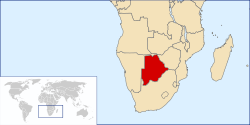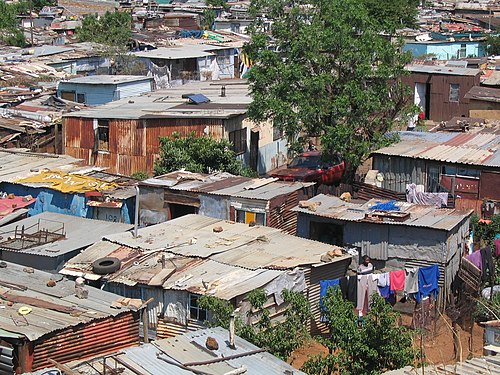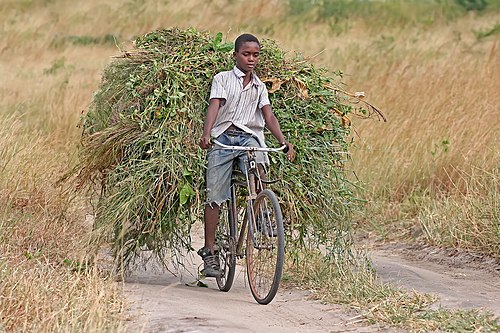Portal:Africa



Africa is the world's second-largest and second-most populous continent after Asia. At about 30.3 million km2 (11.7 million square miles) including adjacent islands, it covers 20% of Earth's land area and 6% of its total surface area. With nearly 1.4 billion people as of 2021, it accounts for about 18% of the world's human population. Africa's population is the youngest among all the continents; the median age in 2012 was 19.7, when the worldwide median age was 30.4. Based on 2024 projections, Africa's population will exceed 3.8 billion people by 2100. Africa is the least wealthy inhabited continent per capita and second-least wealthy by total wealth, ahead of Oceania. Scholars have attributed this to different factors including geography, climate, corruption, colonialism, the Cold War, and neocolonialism. Despite this low concentration of wealth, recent economic expansion and a large and young population make Africa an important economic market in the broader global context, and Africa has a large quantity of natural resources.
Africa is highly biodiverse; it is the continent with the largest number of megafauna species, as it was least affected by the extinction of the Pleistocene megafauna. However, Africa is also heavily affected by a wide range of environmental issues, including desertification, deforestation, water scarcity, and pollution. These entrenched environmental concerns are expected to worsen as climate change impacts Africa. The UN Intergovernmental Panel on Climate Change has identified Africa as the continent most vulnerable to climate change.
The history of Africa is long, complex, and varied, and has often been under-appreciated by the global historical community. In African societies the oral word is revered, and they have generally recorded their history via oral tradition, which has led anthropologists to term them "oral civilisations", contrasted with "literate civilisations" which pride the written word. African culture is rich and diverse both within and between the continent's regions, encompassing art, cuisine, music and dance, religion, and dress.
Africa, particularly Eastern Africa, is widely accepted to be the place of origin of humans and the Hominidae clade, also known as the great apes. The earliest hominids and their ancestors have been dated to around 7 million years ago, and Homo sapiens (modern human) are believed to have originated in Africa 350,000 to 260,000 years ago. In the 4th and 3rd millennia BCE Ancient Egypt, Kerma, Punt, and the Tichitt Tradition emerged in North, East and West Africa, while from 3000 BCE to 500 CE the Bantu expansion swept from modern-day Cameroon through Central, East, and Southern Africa, displacing or absorbing groups such as the Khoisan and Pygmies. Some African empires include Wagadu, Mali, Songhai, Sokoto, Ife, Benin, Asante, the Fatimids, Almoravids, Almohads, Ayyubids, Mamluks, Kongo, Mwene Muji, Luba, Lunda, Kitara, Aksum, Ethiopia, Adal, Ajuran, Kilwa, Sakalava, Imerina, Maravi, Mutapa, Rozvi, Mthwakazi, and Zulu. Despite the predominance of states, many societies were heterarchical and stateless. Slave trades created various diasporas, especially in the Americas. From the late 19th century to early 20th century, driven by the Second Industrial Revolution, most of Africa was rapidly conquered and colonised by European nations, save for Ethiopia and Liberia. European rule had significant impacts on Africa's societies, and colonies were maintained for the purpose of economic exploitation and extraction of natural resources. Most present states emerged from a process of decolonisation following World War II, and established the Organisation of African Unity in 1963, the predecessor to the African Union. The nascent countries decided to keep their colonial borders, with traditional power structures used in governance to varying degrees. (Full article...)
Selected article –
Nairobi National Park is a national park in Kenya that was established in 1946 about 7 km (4.3 mi) south of Nairobi. It is fenced on three sides, whereas the open southern boundary allows migrating wildlife to move between the park and the adjacent Kitengela plains. Herbivores gather in the park during the dry season. Nairobi National Park is negatively affected by increasing human and livestock populations, changing land use and poaching of wildlife. Despite its proximity to the city and its relative small size, it boasts a large and varied wildlife population, and is one of Kenya's most successful rhinoceros sanctuaries. (Full article...)
Featured pictures –
Did you know (auto-generated) -

- ... that the 1862 Brooklyn riot involved a mob mainly comprising Irish Americans targeting African-American workers at a tobacco factory?
- ... that Michigan defensive end Eyabi Okie, ranked number 3 in the 2018 college football recruiting class, changed his surname from "Anoma" to recognize his mother who lives in Africa?
- ... that land for a library built for African Americans in Virginia was donated by Pope Pius XII?
- ... that after Benjamin Moloise's execution, the extremist group Direct Action bombed two Paris companies linked to South Africa in protest?
- ... that enrollment at a school for African-American students in Virginia grew from 14 pupils to 1,300 in its first ten years?
- ... that the Enterprise, a black newspaper in Omaha, supported a separate African American department at the 1898 Trans-Mississippi Exposition?
Categories
Selected biography –
Evelyn Ntoko Mase (18 May 1922 – 30 April 2004), later named Evelyn Rakeepile, was the first wife of the South African anti-apartheid activist and the future president Nelson Mandela, to whom she was married from 1944 to 1958. Mase was a nurse by profession.
Born in Engcobo, Transkei, Mase was orphaned as a child. She moved to Johannesburg to train as a nurse, and there met and married Mandela. Living together in Soweto, they raised four children, three of whom—Thembekile, Makgatho, and Makaziwe—survived into adulthood. She trained to be a midwife while working as a nurse. In the 1950s, her relationship with Mandela became strained. He was becoming increasingly involved in the African National Congress and its campaign against apartheid; Mase eschewed politics and became a Jehovah's Witness. She also accused him of adultery with several women, an accusation corroborated by later biographies, and of being physically abusive, something he always denied. They separated in 1956. She initially filed for divorce, but did not go through with the legal proceedings. In 1958, Mandela, who was hoping to marry Winnie Madikizela, obtained an uncontested divorce from Mase. (Full article...)
Selected country –
 |

|
|

| ||
Botswana, officially the Republic of Botswana (Tswana: Lefatshe lo Botswana), is a landlocked nation in Southern Africa. Citizens of Botswana are Batswana (singular: Motswana), regardless of ethnicity. Formerly the British protectorate of Bechuanaland, Botswana adopted its new name after becoming independent within the Commonwealth on 30 September 1966. Bordered by South Africa to the south and southeast, Namibia to the west, Zambia to the north, and Zimbabwe to the northeast, it is divided into nine districts, which are further subdivided into a total twenty-eight subdistricts.
For over 30 years, Botswana had the fastest growing economy in the world, with growth averaging over 9% per year from 1966 to 1999. The economy, closely tied to South Africa's, is dominated by mining (38 percent), services (44 percent), construction (7 percent), manufacturing (4 percent) and agriculture (2 percent). Botswana has been hit very hard by the AIDS epidemic; the average life expectancy in Botswana at birth has declined from 64 years in 1990 to 50.6 years in 2007. (Read more...)
Selected city –

Enugu (Igbo: Ọ̀hà Enugu) verbally pronounced as "Enụgwụ" by the Igbo indigenes is a state in the South-East geopolitical zone of Nigeria, bordered to the north by the states of Benue and Kogi, Ebonyi State to the east and southeast, Abia State to the south, and Anambra State to the west. The state takes its name from its capital and largest city, Enugu. The city acquired township status in 1917 and was called Enugwu-Ngwo. Due to the rapid expansion towards areas owned by other indigenous communities, it was renamed Enugu in 1928.
Of the 36 states, Enugu is the 29th largest in area and 22nd most populous with an estimated population of over 4.4 million as of 2016. Geographically, the state is divided between the Niger Delta swamp forests in the far south and the drier Guinean forest–savanna mosaic with some savanna in the rest of the state. Other important geographical features are the Udi-Nsukka Plateau and Ekulu River, which flows through the city of Enugu. (Full article...)
In the news
- 15 April 2025 – Sudanese civil war, Foreign aid to Sudan
- Humanitarian impact of the Sudanese civil war
- The European Union and its member states pledge €522 million (US$590 million) and the United Kingdom pledges £120 million (US$141 million) in humanitarian aid to Sudan to deliver food and supplies to over 650,000 internally displaced Sudanese people affected by the fighting between the Rapid Support Forces and the Sudanese Armed Forces. The two groups also call for an immediate ceasefire to end the war. (DW) (AP)
- 15 April 2025 – Algeria–France relations
- France expels twelve Algerian diplomatic officials from the country after Algeria expelled twelve French officials yesterday over the arrest of an Algerian consular official in a kidnapping case. France also recalls its ambassador from Algiers. (AP) (Bloomberg)
- 14 April 2025 – Gaza war
- Indonesian President Prabowo Subianto tours the Middle East to seek support from Egypt, Jordan, Qatar, Turkey, and the United Arab Emirates for his proposed plan to temporarily evacuate 1,000 Palestinians from the Gaza Strip to Indonesia. (Indonesia Business Post)
- 14 April 2025 – Herder–farmer conflicts in Nigeria
- At least 51 people are killed in escalating clashes between rival herders in Plateau State, Nigeria, while another 2,000 people are displaced, according to Amnesty International. (Reuters)
- 13 April 2025 – Boko Haram insurgency
- Eight people are killed and a dozen others are injured after a roadside bomb suspected to be planted by Islamic extremists hits a bus on the Damboa-Maiduguri highway in Borno State, Nigeria. (AP)
Updated: 23:05, 15 April 2025
General images -
Africa topics
More did you know –
- ... that Dutch malacologist Adolph Cornelis van Bruggen is an expert in African land snails?
- ... that a 20‑day study reported by BirdLife International discovered 265 species of birds in Nki National Park?
- ... that Kalulu, an African boy who died in 1877, was modeled in Madame Tussauds and attended Dr. Livingstone's funeral in London?
- ... that Samuel Jackman Prescod became the first person of African descent elected to the Parliament of Barbados?
Related portals
Major Religions in Africa
North Africa
West Africa
Central Africa
East Africa
Southern Africa
Associated Wikimedia
The following Wikimedia Foundation sister projects provide more on this subject:
-
Commons
Free media repository -
Wikibooks
Free textbooks and manuals -
Wikidata
Free knowledge base -
Wikinews
Free-content news -
Wikiquote
Collection of quotations -
Wikisource
Free-content library -
Wikispecies
Directory of species -
Wikiversity
Free learning tools -
Wikivoyage
Free travel guide -
Wiktionary
Dictionary and thesaurus



























































































